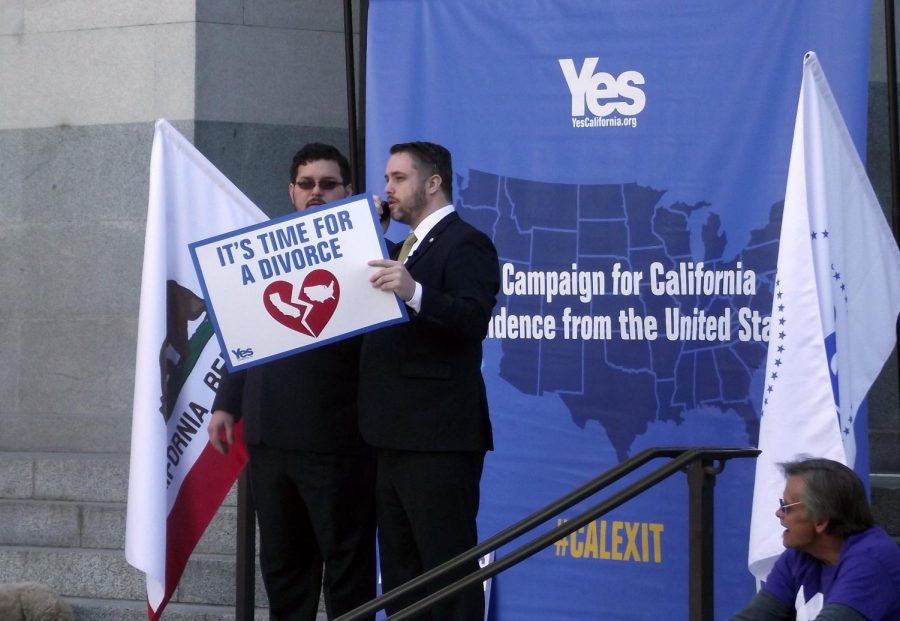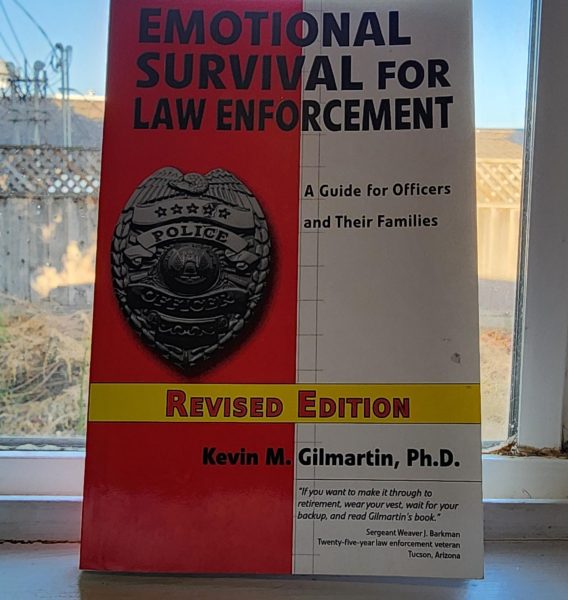CalExit: Discussing the Possibility of an Independent California
Yes California founder Louis Marinelli addresses a crowd of supporters at a recent rally in Sacramento.
“Irreparable and irreconcilable differences: California out of the U.S.A.!” That was the slogan that hundreds of supporters of the upstart “Yes California” campaign marched behind last Wednesday at a rally in Sacramento. “Yes California,” along with other political movements that fall under the umbrella movement “CalExit,” are based around the idea that the state of California would be better off as its own independent nation, or in other words, state secession. That’s certainly a radical prospect, especially considering that no state has ever successfully seceded from the United States in its 241 year-long history. But supporters of the movement argue that independence is not only beneficial, but necessary, to secure prosperity for the state of California and its 40 million residents.
According to supporters of the “CalExit” movement, governance over the state should come from Sacramento — as opposed to the state being controlled on a national level by distant, mostly non-Californian politicians in Washington. “Ultimately, the best people to govern California are us Californians, rather than politicians from the 49 other states,” said Yes California founder Louis Marinelli in an interview last week. “We want to have the power and the freedom to determine our own future. I think that we should be allowed to have the country we want for ourselves.”
Per his organization’s “irreparable differences” slogan, Marinelli also cited political and social differences between California and the rest of the U.S. as grounds for independence. “Most of the 49 other states don’t like California,” said Marinelli. “Our population is incredibly different from the rest of the country. The rest of the country is center-right, and California doesn’t align with that.”
“I think that they would be happy to see us leave,” Marinelli added. “We hear all the time, things like ‘Oh, I can’t wait to hear Nancy Pelosi out of our congress.’ We just support different values — Californian values.”
Many proponents of the “CalExit” movement also see an economic impetus to independence. According to Marinelli, “California is one of those few states that pays more to the IRS than it receives, in fact we lose 103 billion dollars every year in net losses. That’s 103 billion dollars every year that we could be using to fund things like universal health care and education, but right now it all goes to the federal government, and it’s spent on things like the military — spending our money that could be used on free tuition on things like tanks and helicopters.”
Of course, political movements like Yes California do not exactly mark the first time that the possibility of state secession has been proposed. California has always seemed to have something of a rocky relationship with the rest of the U.S., with secession having been proposed over 200 times since the state’s founding in 1850. However, this time around it seems as if secessionist sentiment is starting to get serious. A poll conducted by Ipsos last year found that a solid third of Californians support independence, with an additional 20% “not being opposed” to the prospect.
This recent uptick in support is likely due to the recent election of President Trump, who won a decisive electoral college victory even though 65% of Californians voted against him. “We didn’t vote for him, we didn’t support him, we saw past his racist rhetoric, but now look at where we are — he’s the president,” said Ayla O’Neil, a CalExit supporter in attendance at Wednesday’s Yes California rally. “I just think it’s insane.”

While the prospect of an independent California is exciting for some, others argue that the prospect of independence is dangerous. “[Californians] would be stripped of their rights and protections as U.S. citizens,” wrote David Carrillo in an opinion piece for the San Francisco Chronicle. “Seceding necessarily invokes epic political, economic and military instability.”
Dr. Meredith Heiser, a political science professor at Foothill College, had similar concerns to express. “While California pays more into the US than it probably gets in return, separation is not the answer to me,” Heiser explained in an interview. “There are many political advantages — even under Trump — to being part of the US. I think the real solutions lie more in finding compromises and identifying/accomplishing local priorities. To me the real problems have much more to do with social and economic inequality. That won’t be solved by suddenly becoming a nation-state. They are harder than that.”
While there seems to be a prominent abundance of conflicting opinions concerning the prospect of independence, it is unclear how such independence would actually be achieved. Even if there was statewide consensus in support of it, there are no constitutional provisions that would allow for the state to unilaterally secede. “To me the closest precedent would be the Civil War, and you see how that went,” said Heiser.
Right now, the Yes California campaign seeks to garner the 585,407 signatures needed in order to schedule a plebiscite for the 2020 election, which, if passed, would repeal Article III of the state constitution that declares California to be an “inseparable part” of the U.S. It would also would trigger a referendum for independence — similar to the one in Catalonia l last December. While this may seem like a lofty goal, Marinelli seemed confident of his organization’s ability to obtain that number of signatures. “We’re going to march, we’re going to get the signatures, and we’re going to vote on this thing,” Marinelli said.
Talk of independence raises the question of how California would actually function if it were to become its own sovereign nation. From an economic perspective, California would likely thrive; it would have the sixth largest economy in the world and would be one of the premier exporters of consumer goods and agricultural products. Politically, however, the prospect of independence seems more unclear. As argued by Heiser, “California already operates pretty independently of Washington. Lots of leaders at the federal level come from California, so I think that you could have the present leaders as interim leaders until we could hold new elections and adopt a new constitution.”
However, declaring independence runs the risk of the nation becoming engulfed by Chinese or Russian influence, or of the nation fracturing into pieces shortly following the declaration, which Heiser acknowledged as a risk. “I think voices on the right and left might support becoming a nation state for very different reasons,” Heiser added. “That could then lead to even more conflict in the state than we have now, because the federal government would no longer be there as a sort of common enemy.”
Right now, the California independence movement is still very much up in the air. Even if the 2020 plebiscite happens as envisioned, proponents of the CalExit movement will need to figure out how they will consolidate enough support to pass the initiate — an open question, especially considering that the effects of the 2018 midterm elections will likely play a big role in swaying popular support for the U.S. at large, and its sovereignty over the state of California. And of course, it is entirely unclear by which mechanism California could peacefully secede from the union, as the prospect of another civil war would almost certainly be repudiated by even the staunchest supporters of the independence movement. Right now, an independent California is little more than a dream for the movement’s supporters, and only time will tell if such a dream actually shows signs of becoming a reality.

































































































Eric
Mar 2, 2018 at 5:17 pm
I see professor Heifer’s point about even under Trump being part of America has its advantages. To me, what overtakes any advantage being part of the union is the unfair lack of representation. I don’t want to cede from the union because of a president I disagree with, but because we pay tens of billions more than we take in, and have less proportional representation than any other state. Our votes count less, sometimes much less than anyone else’s, and we are shorted around 50 representatives and electoral votes. That is where I draw the line. It’s reprehensible and nobody will ever fix it because they can take our money and have disproportionate influence at our expense.